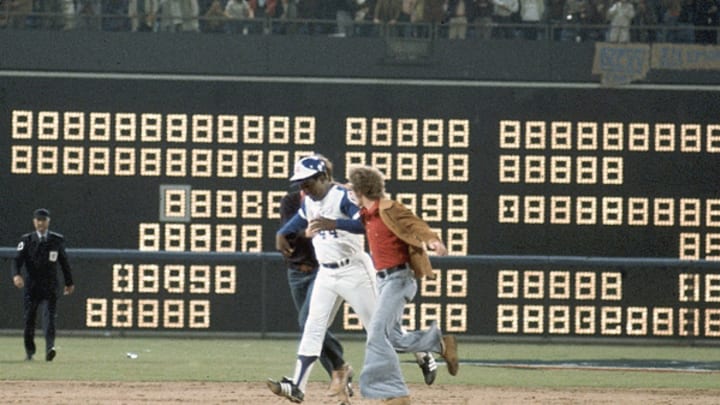Watch: Hank Aaron hits record-breaking 715th homer 40 years ago today

Hank Aaron finished his career with 755 homers, 733 of them hit in 21 years in Atlanta. (Walter Iooss Jr./SI)

Tuesday marks the 40th anniversary of one of the signature moments in baseball history. On April 8, 1974, Hank Aaron surpassed Babe Ruth with his 715th home run, thus becoming the game's all-time leader. Facing the Dodgers at Atlanta Fulton-County Stadium, he turned on an Al Downing fastball, sending it into the Braves' bullpen in left-centerfield.
Below, check out the video clip of Aaron's homer, with the call by Braves broadcaster Milo Hamilton. Note the handshake from Dodgers second baseman Davey Lopes as well as the two frenzied fans who scrambled onto the field and escorted him between second and third base.
[mlbvideo id="4429231" width="600" height="336" /]
The 40-year-old Aaron had waited all winter to surpass the Bambino, having ended the 1973 season with 713 homers. Aided by the hitter-friendly environment of Fulton-County Stadium, which at 1,000 feet above sea level was the majors' highest park at the time, he had hit 203 homers over the previous five years, the most productive stretch of his career, homer-wise. America being a less enlightened place at the time, the winter delay forced him to endure a barrage of racist hate mail that had begun as he approached the hallowed record, requiring bodyguards and police protection on road trips.
Aaron's pursuit of Ruth became even more controversial after he homered off the Reds' Jack Billingham on Opening Day in Cincinnati. The Braves wanted him to set the record at home, so they sat him for the next game. Stuffed-shirt commissioner Bowie Kuhn — a man who rarely found himself on the right side of an issue yet somehow wound up in the Hall of Fame — ordered him restored to the lineup lest the Braves face "serious consequences." Aaron went 0-for-3 in the series finale before returning to Atlanta. After walking in his first plate appearance against Downing, he pounced during the second one for the record-setting home run. Here's the description from SI's Ron Fimrite:
Downing's momentous mistake was a high fastball into Aaron's considerable strike zone. Aaron's whip of a bat lashed out at it and snapped it in a high arc toward the 385-foot sign in left center field. Dodgers centerfielder Jimmy Wynn and leftfielder Bill Buckner gave futile chase, Buckner going all the way to the six-foot fence for it. But the ball dropped over the fence in the midst of a clutch of Braves relief pitchers who scrambled out of the bullpen in pursuit. Buckner started to go over the fence after the ball himself, but gave up after he realized he was outnumbered. It was finally retrieved by reliever Tom House, who even as Aaron triumphantly rounded the bases ran hysterically toward home plate holding the ball aloft. It was, after all, one more ball than Babe Ruth ever hit over a fence, and House is a man with a sense of history.
House arrived in time to join a riotous spectacle at the plate. Aaron, his normally placid features exploding in a smile, was hoisted by his teammates as Downing and the Dodger infielders moved politely to one side. Aaron shook hands with his father Herbert, and embraced his mother Estella. He graciously accepted encomiums from his boss, Braves Board Chairman Bill Bartholomay, and Monte Irvin, representing Commissioner Bowie Kuhn, who was unaccountably in Cleveland this eventful night. Kuhn is no favorite of Atlanta fans and when his name was mentioned by Irvin, the largest crowd ever to see a baseball game in Atlanta booed lustily.
As memorable as the call from Hamilton was, Dodgers announcer Vin Scully turned in one for the ages, too; you can hear it here. After informing listeners that the ball went out, Scully let the crowd speak for itself for more than a minute and a half before continuing:
“What a marvelous moment for baseball. What a marvelous moment for Atlanta and the state of Georgia. What a marvelous moment for the country and the world. A black man is getting a standing ovation in the Deep South for breaking a record of an all-time idol. And it is a great moment for all of us, and particularly for Henry Aaron.”
Aaron left the Braves after the 1974 season, returning to Milwaukee — where he had started his major league career in 1954 after brief stints in the Negro American League and the low minors — with the Brewers. He played two more seasons, finishing his career with 755 homers, a mark that stood until Barry Bonds passed him with considerably more controversy and less celebration on Aug. 8, 2007.
VERDUCCI: Why Hank Aaron is still baseball's true home run king
